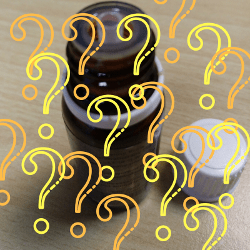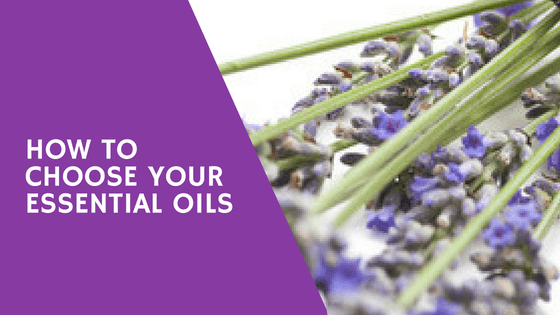So, how do you choose your essential oils? 
If someone has recommended an oil to you, what is their experience? If it’s someone who has used the oil with success for your particular complaint, great, it may be that it can help yours. Where did they get the initial advice from? Was it something they saw on the internet, was it from a qualified individual, an essential oil retailer or an essential oil distributing representative?
The thing is, in this age of information we’re being bombarded with facts and details, so the source of it is important. If you’re taking advice from a qualified individual, it’s their reputation and their insurance on the line. Take it from a friend or a distributor then there’s no insurance or comeback if anything goes wrong.
If your friend has used something, let’s say for example, they found a preparation containing St Johns Wort and Sweet Birch. They may recommend it to you but not know you’ve been taking antidepressants, you’ve got sensitive skin and an aspirin allergy. Tell an aromatherapist what you’re planning and they will tell you in no uncertain terms that you need to avoid this blend. Book an appointment with the aromatherapist and they will give you a detailed response about why this blend is going to be a big problem for you, ask some questions about what you’re trying to achieve and then formulate a bespoke blend based on what you’ve told them. And this is where the problem comes in, because oils are natural and people want to use natural things, you may forget that these are natures’ medicines. These are the things, like many things in nature, where less can be more and high quantities can be a problem.
How can you safely choose your oils?
Choosing your essential oils should involve some research, and ideally, you should check in with an aromatherapist if you’re looking at specific conditions. Think they cost a lot? You’re paying for their expertise, their years of training and continuing professional development, which is absolutely critical as new research is being regularly released and upsetting previous held beliefs. Old beliefs still exist on the internet, and advice which may have appeared sound ten years ago has now been disproved and is no longer practiced. Aromatherapists will apply their knowledge base to make a blend, making sure the recommendations are based on the person with a risk versus benefit approach.
Really can’t afford an aromatherapy appointment? Why not buy a book? There are many books which contain sound information with formulations of a standard dilution, pointing out safety considerations. Some oils have very few safety considerations and can be used in applications without additional considerations, while others do have stringent advice based on their chemical composition. Often the oils which are the most potent are able to assist in difficult conditions, but come with caveats for their use. The risks need to be understood and it’s important to only use the oil if you feel it’s the most suitable choice. Can’t make up your mind? Again, that’s why you would pay for the expertise of an aromatherapist. Often you will find there can be an oil for a condition, but there are often 3 or 4 different oils which can be beneficial for an issue, and it may be that on further questioning one of those is actually more suitable.
Found something on the internet? It’s probably best to do further research about the person recommending it. If it’s out in the public arena, its a generic suggestion which isn’t taking into account the individuality of the person. If it’s an oil retailer or representative, their advice may be sound, but you need to be careful. Their primary aim is to sell you an oil and they may not be suitably qualified. Some retailers are also aromatherapists and are qualified to provide the advice, while others are telling you benefits but don’t have the qualifications.
Gone into a shop and like the aroma? Then, if you’re planning on popping a little in a diffuser, or on a tissue, chances are it’s going to be fine. Many potent essential oils don’t have the most aromatically appealing fragrances, and if you’re a healthy adult who is not taking any medication, you’re diffusing sensibly and following the instructions on the side of the bottle, then you shouldn’t encounter any issues.
So, when you’re thinking about why you’re buying your essential oil, think about the reason you want it and check it is the most suitable one for you.
 Louise is an holistic therapist who owns Therapy Centre, Bristol BS14 9HB, a clinic offering a range of holistic and beauty therapies. Louise offers reflexology, aromatherapy, holistic massage, Indian head massage, reiki, baby massage and story massage. She is a mum of two boys and when she is not working she enjoys getting outdoors with her family. For further information about Louise, visit louise-morgan.co.uk.
Louise is an holistic therapist who owns Therapy Centre, Bristol BS14 9HB, a clinic offering a range of holistic and beauty therapies. Louise offers reflexology, aromatherapy, holistic massage, Indian head massage, reiki, baby massage and story massage. She is a mum of two boys and when she is not working she enjoys getting outdoors with her family. For further information about Louise, visit louise-morgan.co.uk.

